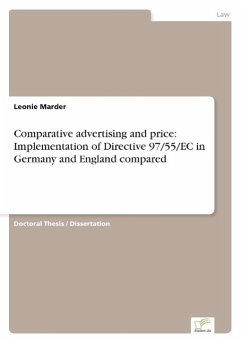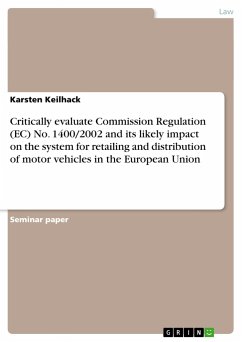Doctoral Thesis / Dissertation from the year 2004 in the subject Law - Civil / Private / Trade / Anti Trust Law / Business Law, University of the West of England, Bristol (Faculty of Social Sciences, School of Law), language: English, abstract: Inhaltsangabe:Abstract:
With the coming into force of Directive 97/55/EC, one of the issues that arose was as to how EU Member States will choose to implement the provisions concerning admissibility of comparative advertising.
This dissertation will focus on the Directive s transposition into English and German law with special regard to price comparisons, each model of implementation being situated at the extreme end of the scale.
English law, having traditionally supported comparative advertising now has had to face a much stricter approach put forward by the Directive. We shall enquire into the extent to which, in absence of an English law of unfair competition, s.10(6) of the 1994 Trade Marks Act, the torts of passing off and injurious falsehood, and the British Code of Advertising provide for compliance in that sphere.
German law, on the other hand, having long opposed comparative advertising, has readily incorporated Directive 97/55 into
2 and 3 of its 1909 Act Against Unfair Competition (UWG). German literature on the Act s compliance with the Directive has been widespread and the respective analysis will thus be limited to assessing opinions of academics, lawyers, judges, and members of the German government.
I then compared those two models of implementation from the wider angle of the civil law/common law divide and general principles underlying Community law, before finally making proposals for amendments and assessing the impact the Directive had on each national law system.
Effectively, German law has thus, in my view, provided for implementation to a fuller extent, as well as being the Member State which has felt the Directive s impact much more strongly than England.
Inhaltsverzeichnis:Table of Contents:
Introduction1
Chapter 1.The Law of Comparative Advertising in England7
1.1Rejection of a Law of Unfair Competition9
1.2The Law of Comparative Advertising11
1.3Implementation of Directive 97/55/EC14
Chapter 2.The Law of Comparative Advertising in Germany22
2.1The Law of Unfair Competition under the 1909 Act Against Unfair Competition22
2.2Implementation of Directive 97/55/EC26
Chapter 3.Analysis: Implementation of Directive 97/55/EC in England and Germany compared33
Conclusion43
Annex47
Bibliography47
Table of cases52
Statutory material53
Hinweis: Dieser Artikel kann nur an eine deutsche Lieferadresse ausgeliefert werden.
With the coming into force of Directive 97/55/EC, one of the issues that arose was as to how EU Member States will choose to implement the provisions concerning admissibility of comparative advertising.
This dissertation will focus on the Directive s transposition into English and German law with special regard to price comparisons, each model of implementation being situated at the extreme end of the scale.
English law, having traditionally supported comparative advertising now has had to face a much stricter approach put forward by the Directive. We shall enquire into the extent to which, in absence of an English law of unfair competition, s.10(6) of the 1994 Trade Marks Act, the torts of passing off and injurious falsehood, and the British Code of Advertising provide for compliance in that sphere.
German law, on the other hand, having long opposed comparative advertising, has readily incorporated Directive 97/55 into
2 and 3 of its 1909 Act Against Unfair Competition (UWG). German literature on the Act s compliance with the Directive has been widespread and the respective analysis will thus be limited to assessing opinions of academics, lawyers, judges, and members of the German government.
I then compared those two models of implementation from the wider angle of the civil law/common law divide and general principles underlying Community law, before finally making proposals for amendments and assessing the impact the Directive had on each national law system.
Effectively, German law has thus, in my view, provided for implementation to a fuller extent, as well as being the Member State which has felt the Directive s impact much more strongly than England.
Inhaltsverzeichnis:Table of Contents:
Introduction1
Chapter 1.The Law of Comparative Advertising in England7
1.1Rejection of a Law of Unfair Competition9
1.2The Law of Comparative Advertising11
1.3Implementation of Directive 97/55/EC14
Chapter 2.The Law of Comparative Advertising in Germany22
2.1The Law of Unfair Competition under the 1909 Act Against Unfair Competition22
2.2Implementation of Directive 97/55/EC26
Chapter 3.Analysis: Implementation of Directive 97/55/EC in England and Germany compared33
Conclusion43
Annex47
Bibliography47
Table of cases52
Statutory material53
Hinweis: Dieser Artikel kann nur an eine deutsche Lieferadresse ausgeliefert werden.








